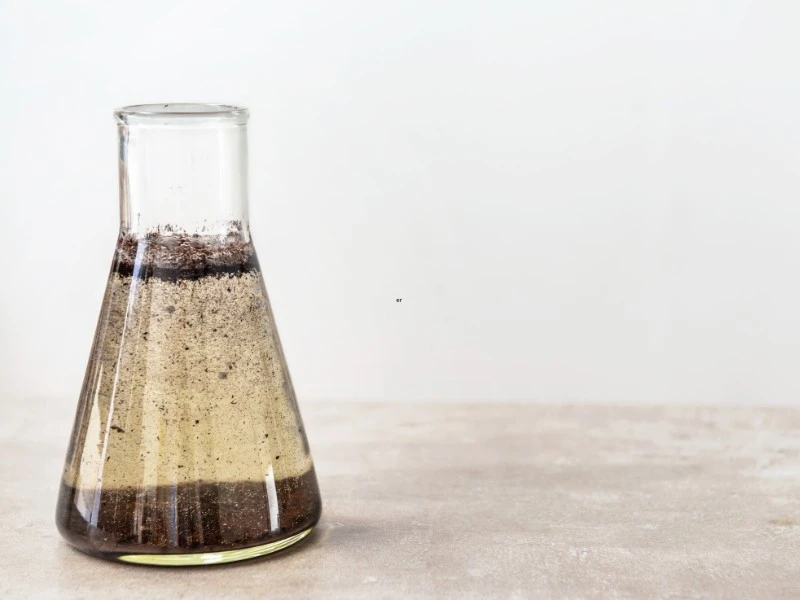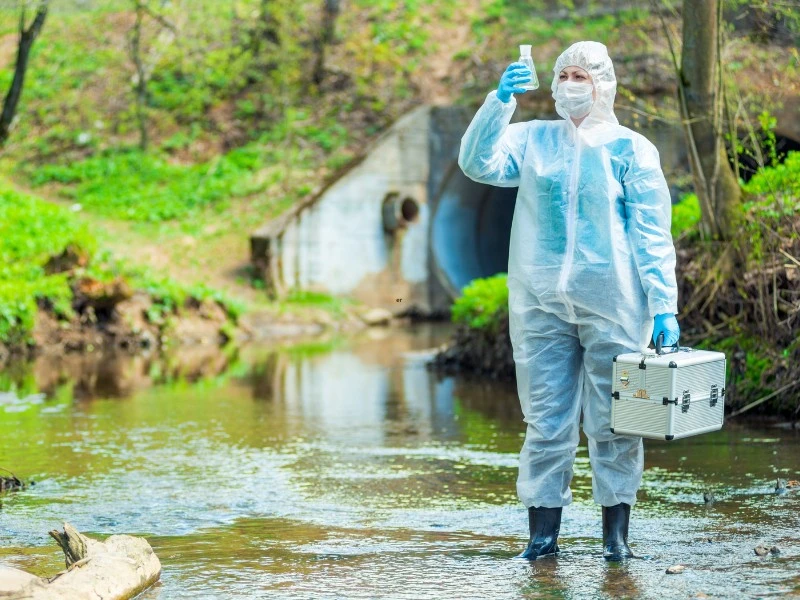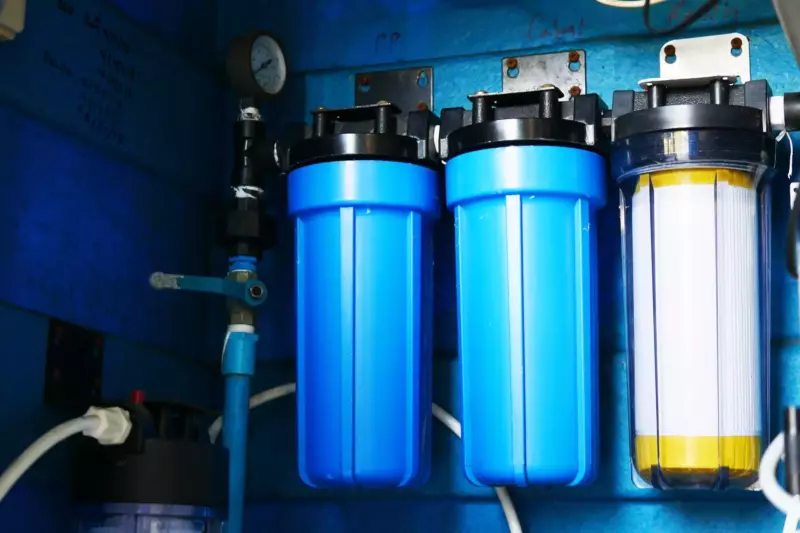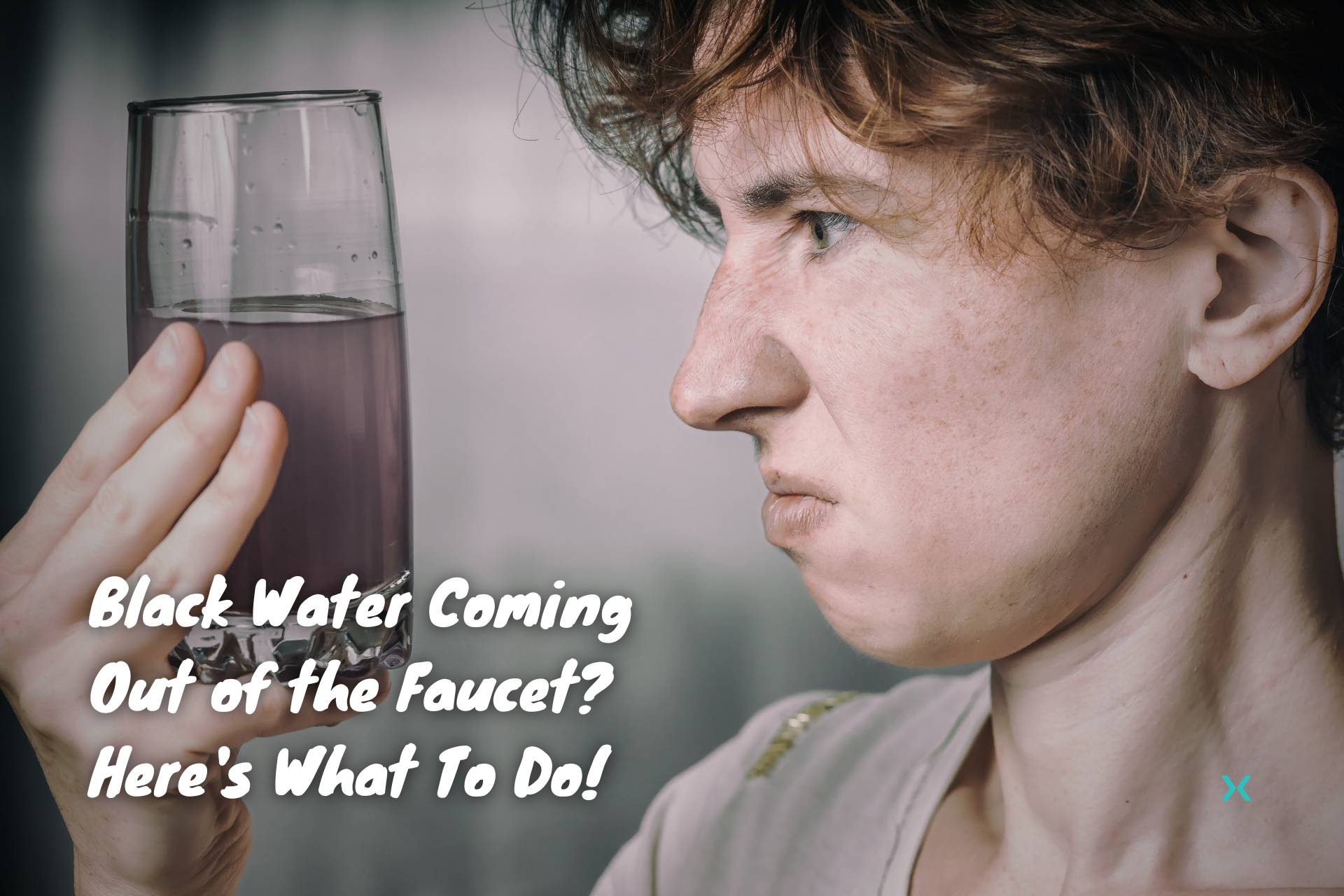💧 Black Water Coming Out of Faucet? Here’s What To Do!
It can be alarming and unsettling to turn on your faucet and see black water pouring out. While it may seem like a major issue, there are steps you can take to address the problem.
In this article, we’ll discuss the causes of black water, what immediate steps to take, how to test your water quality and solutions for treating black water.
Table of Contents
💧 Understanding the Causes of Black Water

Before you can address the issue of black water, it’s important to understand what’s causing it. There are several reasons why you may be experiencing black water in your home.
❌ Sediment Buildup in Pipes
Over time, sediment can accumulate in pipes, which can cause discoloration and cloudiness in your water. This is a common problem in areas with hard water, which is water that has a high mineral content.
Hard water can cause mineral buildup in pipes, leading to clogs and water discoloration. If you have older pipes, they may be more susceptible to sediment buildup. It’s important to have your pipes inspected regularly to prevent this issue.
One way to prevent sediment buildup is to install a water softener system. Water softeners are devices that remove mineral deposits from the water, preventing them from accumulating in your pipes.
This can help improve the quality of your water and prevent discoloration.
❌ Corroded Plumbing Fixtures
Sometimes the cause of discolored water is corroded plumbing fixtures, such as faucets or pipes. Corrosion can occur when the metal in the plumbing fixtures breaks down over time. This can cause the metal to leach into the water, resulting in discolored water.
If the pipes in your house are made of steel or galvanized material, they may develop mineral flakes from exposed iron that can mix with your water. This can give your water a deep black color and impact its taste and quality.
If you suspect that your plumbing fixtures are corroded, it’s important to have your plumbing system inspected by a professional plumber. They can assess the extent of the damage and recommend the best course of action.
In some cases, the fixtures may need to be replaced.
❌ Water Supply Contamination
In rare cases, black water may be the result of contamination in the water. This could be from algae blooms, industrial waste, or sewage overflows.
If you suspect that your water is contaminated, it’s important to contact your water provider immediately. They will have a process in place for handling these types of issues, which may include flushing the system or issuing a boil water advisory.
It’s important to note that black water can be a health hazard, as it may contain harmful contaminants.
❌ Mineral Deposits
When too much iron and manganese are present in drinking water, whether it comes from a private well or a public water supply, it appears as a brown or black stain on sinks and fixtures and sometimes as particles that float to the top of the water.
When these excess minerals mix with oxygen, they can give the water a blackish tint.
This discoloration may also be caused by dissolved manganese, which creates a black tint in water at concentrations above 0.05 milligrams per liter.
❌ Water Softener Malfunction
Lastly, natural resin beads from your water softener may also cause black water. These typically black resin beads can get released into your water system when the softener breaks down or malfunctions.
Regardless of the reason for black water, it is advisable to contact a trusted water softener company that can analyze your water and offer appropriate filtration or treatment options.
💧 Immediate Steps to Take When You Notice Black Water

If you notice black water coming out of your faucet, there are a few immediate steps you should take. Black stuff in your tap water can be a sign of a serious problem with your plumbing, so it’s important to act quickly.
🧰 Turn Off the Main Supply Valve.
The first thing you should do is turn off the main supply. This will prevent any more contaminated water from flowing into your home.
If the water is contaminated, it could be harmful to your health if cold water is ingested or used for bathing.
🧰 Check Other Faucets in Your Home
If possible, check other faucets in your home to see if the issue is isolated to one fixture or if it’s a larger problem. If the problem is isolated, it may be a problem with that specific fixture.
However, if multiple faucets are affected, it may be a larger issue with your plumbing or water heater supply. It’s also important to check any appliances that use water, such as your dishwasher or washing machine.
If the water is contaminated, it could damage these appliances and require costly repairs.
🧰 Contact Your Water Provider
Your water provider should be your next call. They will be able to determine if there is a known issue with the water supply and can advise you on the next steps.
They may also send someone to your home to test the water and determine the cause of the problem. In the meantime, it’s important to avoid using any water in your home until the issue has been resolved.
This includes not using the toilet or showering, as the contaminated water could be harmful to your health.
🧰 Call an Experienced Plumber
If the issue is isolated to your plumbing, you should call a local plumber to inspect and repair the problem. Black water can be a sign of a serious issue, such as a broken sewer line or corroded pipes, so it’s important to have it fixed as soon as possible.
A plumber can also advise you on any necessary precautions to take, such as boiling your water before use, using a water filtration system, and conducting proper water heater maintenance.
By taking these immediate steps, you can help protect your health and prevent further damage to your home and appliances.
💧 How to Test Your Water Quality

If you are concerned about the quality of your water, there are a few ways you can test it. It’s important to know what’s in your water to ensure that it is safe for you and your family to drink.
🧰 DIY Water Testing Kits
You can purchase DIY water testing kits online or at a local hardware store. These kits typically involve taking a sample of your water and sending it to a lab for analysis.
The process is relatively simple and can provide you with a basic understanding of the quality of your water. When using a DIY water testing kit, it’s important to follow the instructions carefully to ensure accurate results.
You may need to collect a sample of water from different sources in your home, such as your kitchen sink and bathroom faucet, to get a comprehensive understanding of your water quality. It’s important to note that DIY water testing kits may not detect all contaminants in your water.
If you are concerned about specific contaminants, such as lead or bacteria, you may need to use a more specialized testing method.
🧰 Professional Water Testing Services
You can also hire a professional water testing service to come to your home and test your water. This option may be more expensive, but it can provide more detailed information about the quality of your water.
Professional water testing services can test for a wide range of contaminants, including lead, arsenic, bacteria, and pesticides. They may also test for other factors, such as pH levels and water hardness.
When choosing a professional water testing service, it’s important to do your research. Look for a reputable company with experience in water testing.
You may also want to ask for references or read online reviews to ensure that you are getting a reliable service.
🧰 Interpreting Water Test Results
When you receive the results of your water test, it’s important to understand what they mean. Look for levels of contaminants such as lead, arsenic, and bacteria.
Your local health department or water provider can help you interpret the results. If your water test results show high levels of contaminants, you may need to take action to improve the quality of your water.
This may involve installing a water filtration system or making changes to your plumbing. It’s important to regularly test your water to ensure that it remains safe for you and your family to drink.
By understanding the quality of your water, you can take steps to protect your health and well-being.
💧 Solutions for Treating Black Water

Once you have determined the cause of your black water, there are several solutions for treating the problem.
🧰 Flushing Your Plumbing System
One solution is using hot water to flush your plumbing system. This involves running the water for several minutes to help remove any sediment or build-up in the pipes.
🧰 Installing Water Filters
Another option is to install water filters, which removes excess minerals and contaminants from your water system. There are different types of filters available, including carbon filters and reverse osmosis systems.
🧰 Replacing Old Pipes and Fixtures
If your pipes or plumbing fixtures are the source of the problem, you may need to replace them. This can be a more expensive option, but it’s necessary if the issue is ongoing.
🧰 Repairing a Defective Water Softener
Fortunately, repairing or replacing a malfunctioning water softener can help prevent black water from occurring and restore the quality of your water supply.
A water softener professional can diagnose the problem, fix or replace the device and test the water quality to ensure that it is safe and free of any discoloration or contamination.
💧 Final Thoughts

No matter what you decide to do, taking black water seriously is important.
By understanding the causes and taking immediate action, you can help ensure your family’s and your home’s health and safety.
If you’d like to expand your knowledge about your home’s plumbing systems, feel free to explore our other articles on the plumbing blog.
Related Reading: DIY Guide to 15 Common Plumbing Problems & Solutions

